![]()
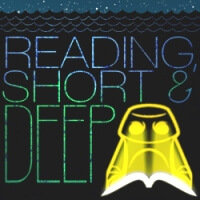 Reading, Short And Deep #229
Reading, Short And Deep #229
Eric S. Rabkin and Jesse Willis discuss Shadows by Clark Ashton Smith
Here’s a link to a PDF of the poem.
Shadows was first published in Weird Tales, February 1930.
Posted by Scott D. Danielson
![]()
 Reading, Short And Deep #229
Reading, Short And Deep #229
Eric S. Rabkin and Jesse Willis discuss Shadows by Clark Ashton Smith
Here’s a link to a PDF of the poem.
Shadows was first published in Weird Tales, February 1930.
Posted by Scott D. Danielson

 The SFFaudio Podcast #486 –The City Of The End Of Things by Archibald Lampman; read by Mr Jim Moon. This is an unabridged reading of the poem (5 minutes) followed by a discussion of it. Participants in the discussion include Jesse, Mr Jim Moon, and Prof. Eric S. Rabkin.
The SFFaudio Podcast #486 –The City Of The End Of Things by Archibald Lampman; read by Mr Jim Moon. This is an unabridged reading of the poem (5 minutes) followed by a discussion of it. Participants in the discussion include Jesse, Mr Jim Moon, and Prof. Eric S. Rabkin.
Talked about on today’s show:
Jesse goes crazy, this guy’s amazing!, unheard of, earlier and later weird poetry, Ezra Pound and T.S. Elliot, the poems of Clark Ashton Smith, child prodigy out of California writes amazing poetry!, Hamilton, poetry without music isn’t mainstream anymore, rhyme and verbal invention, evolutionarily pro-adaptive, mate-getting and gene replication, fashion, Dr. Bowdler’s Legacy, Sir Walter Scott, immoral novels, flat-chested sexy women, enormously mammary sexy women, almost perfect rhyme and rhythm, doggerel, Alexander Pope, the Canadian Keats, romantic poetry, William Wordsworth, Archibald Lampman on twitter: @alampman, H.P. Lovecraft, almost Lovecraftian, cosmicism, a dream poem, A Thunderstorm, multi-valent meaning, depths, circles, 1894, multiple ways to understand,
BESIDE the pounding cataracts
Of midnight streams unknown to us,
’T is builded in the dismal tracts
And valleys huge of Tartarus.
Lurid and lofty and vast it seems;
It hath no rounded name that rings,
But I have heard it called in dreams
The City of the End of Things.Its roofs and iron towers have grown
None knoweth how high within the night,
But in its murky streets far down
A flaming terrible and bright
Shakes all the stalking shadows there,
Across the walls, across the floors,
And shifts upon the upper air
From out a thousand furnace doors;
And all the while an awful sound
Keeps roaring on continually,
And crashes in the ceaseless round
Of a gigantic harmony.
Through its grim depths reëchoing,
And all its weary height of walls,
With measured roar and iron ring,
The inhuman music lifts and falls.
Where no thing rests and no man is,
And only fire and night hold sway,
The beat, the thunder, and the hiss
Cease not, and change not, night nor day.
lurid night, end of days, a Dying Earth story, an automated factory, a city at the end of time, post humanity, the end of things we have made, at the end of the concept of things (manufacture and industry), bursting with different ways of looking, a Canadian Shelley, “hail to thee blithe spirit”, Ozymandias, the works of man, creation, what does the first “of” mean, the telos of things, removing humanity, leafless vs. dismal, sonorous description, murky, flaming, what does this presage?, “wandering lonely as a cloud”, the creations of man persisting, leafless tracts, lands with no leaves, books without pages, making decisions, this is a fantasy or this is a science fiction, dreams as vision, genre distinctions, Edgar Allan Poe, Dreamland, “bottomless vales”, pastoral Gothic bound in human emotion, looking forward, shadows echoes, rings and rounded, the end of a cycle, a nadir, the end of a phase, the poem is the city, the poem becomes the city, “unknown to us”, fore and aft in time, adjective vs. adverb, multiple meanings, once we “see”, a derivative meaning of cataracts, waterfall, extraordinary! extraordinary!, referring to himself, putting in vs. allowing in, this city has no name, it hath no rounded name, “Megacity 422”, a sense of gears turning, verticality and depth, this could be a clock (except for all the fire), foundry factory, uninhabitable, seeing this as astronomy, the music of the spheres, an awful sound (full of awe for us), what is a rounded name? Bubbles, Radar, the fixed stars, wandering planets, the Earth, a sublunary place, in addition, none know it now, set in Hell, Tartarus, the “Titan Woods” in Dreamland, a place and a being, Chaos and Gaia, Hesiod, an area in Hades, defeated titans, imprisoned cyclopes, the Gold, Silver, Brass, and Iron ages, the heat death of the universe, Samuel Taylor Coleridge, an absent sun, the end of the industrial world, philosophical depths, how is a height weary?, The Machine Stops by E.M. Forster, Kubla Khan; or, A Vision in a Dream: A Fragment, The Time Machine by H.G. Wells, the hell of the mechanized underworld, and the garden above (until the night comes),
In Xanadu did Kubla Khan
A stately pleasure-dome decree:
Where Alph, the sacred river, ran
Through caverns measureless to man
Down to a sunless sea.
So twice five miles of fertile ground
With walls and towers were girdled round;
And there were gardens bright with sinuous rills,
Where blossomed many an incense-bearing tree;
And here were forests ancient as the hills,
Enfolding sunny spots of greenery.
sunlights and blossoms, a dream interrupted, a river ringing the city of the end of things is Omega,
And moving at unheard commands,
The abysses and vast fires between,
Flit figures that, with clanking hands,
Obey a hideous routine.
They are not flesh, they are not bone,
They see not with the human eye,
And from their iron lips is blown
A dreadful and monotonous cry.
And whoso of our mortal race
Should find that city unaware,
Lean Death would smite him face to face,
And blanch him with its venomed air;
Or, caught by the terrific spell,
Each thread of memory snapped and cut,
His soul would shrivel, and its shell
Go rattling like an empty nut.It was not always so, but once,
In days that no man thinks upon,
Fair voices echoed from its stones,
The light above it leaped and shone.
Once there were multitudes of men
That built that city in their pride,
Until its might was made, and then
They withered, age by age, and died;
And now of that prodigious race
Three only in an iron tower,
Set like carved idols face to face,
Remain the masters of its power;
And at the city gate a fourth,
Gigantic and with dreadful eyes,
Sits looking toward the lightless north,
Beyond the reach of memories:
Fast-rooted to the lurid floor,
A bulk that never moves a jot,
In his pale body dwells no more
Or mind or soul,—an idiot!
ITS ROBOTS!, Hephaestus, automaton owls, iron lips, warehouses, dump truck, the garbage truck, automated sounds, metaphorizing the pieces of the machine, exquisite control of language, imabic tetrameter, that empty nut, a prelapsarian time, the mechanized is ultimately the problem, mysterious, people built this city, now they’re dead except for three, Jesse’s illustration, a nightmare vision, the controllers of the city?, a fourth, Dreams Of Yith by Duane W. Rimel and H.P. Lovecraft, The Night Land by William Hope Hodgson, the huge sentinel, an insane person (a nut case), vapid empty mindlessness, trapped in the iron tower, prisoners, The Technological Society by Jacques Ellul, the citizen who does not participate, the three and the one, we’ve done this to ourselves, human perfection as an oxymoron, mortal races, who did the setting?, an exclusion, the idiot remains,
But some time in the end those three
Shall perish and their hands be still,
And with the masters’ touch shall flee
Their incommunicable skill.
A stillness, absolute as death,
Along the slacking wheels shall lie,
And, flagging at a single breath,
The fires shall smoulder out and die.
The roar shall vanish at its height,
And over that tremendous town
The silence of eternal night
Shall gather close and settle down.
All its grim grandeur, tower and hall,
Shall be abandoned utterly,
And into rust and dust shall fall
From century to century.
Nor ever living thing shall grow,
Or trunk of tree or blade of grass;
No drop shall fall, no wind shall blow,
Nor sound of any foot shall pass.
Alone of its accurséd state
One thing the hand of Time shall spare,
For the grim Idiot at the gate
Is deathless and eternal there!
who is this grim idiot?, idiom, Time, Lean Death, playing VR games, are they the masters?, master’s, Voices Of Earth, the mechanism underneath everything, the physics underneath reality, if this is all metaphor…, emojis that look like you, emoticons, technology, part of the reason to have poetry: to communicate the incommunicable, “grim”, a haunting spirit, “the graveyard grims” giant spectral hounds that guarded cemeteries, the wheel, the Hell turns off, a science fiction poem, The Valley Of Unrest by Edgar Allan Poe,
Once it smiled a silent dell
Where the people did not dwell;
They had gone unto the wars,
Trusting to the mild-eyed stars,
Nightly, from their azure towers,
To keep watch above the flowers,
In the midst of which all day
The red sun-light lazily lay.
Now each visitor shall confess
The sad valley’s restlessness.
Nothing there is motionless —
Nothing save the airs that brood
Over the magic solitude.
Ah, by no wind are stirred those trees
That palpitate like the chill seas
Around the misty Hebrides!
Ah, by no wind those clouds are driven
That rustle through the unquiet Heaven
Uneasily, from morn till even,
Over the violets there that lie
In myriad types of the human eye —
Over three lilies there that wave
And weep above a nameless grave!
They wave: — from out their fragrant tops
Eternal dews come down in drops.
They weep: — from off their delicate stems
Perennial tears descend in gems.
Reading, Short And Deep, But who Can Replace A Man? by Brian Aldiss, a missing piece of the puzzle from the dialogue of science fiction and fantasy, City Of The Titans, City At The Edge Of Forever by Harlan Ellison, an anthology of Victorian verse, The Atlantic Monthly, March 1894, the praise of Lampman as a nature poet, The City by Ray Bradbury, inimical to man, There Will Come Soft Rains by Ray Bradbury, Sara Teasdale’s There Will Come Soft Rains, WWI,
There will come soft rains and the smell of the ground,
And swallows circling with their shimmering sound;And frogs in the pools singing at night,
And wild plum-trees in tremulous white;Robins will wear their feathery fire
Whistling their whims on a low fence-wire;And not one will know of the war, not one
Will care at last when it is done.Not one would mind, neither bird nor tree
If mankind perished utterly;And Spring herself, when she woke at dawn,
Would scarcely know that we were gone.
we are very dangerous for ourselves, a poet who should not be forgotten, the scholarship, so many layers, its marvelous, repeating words strategically, the theme being revealed, such a deep feeling for what it is that he’s about.
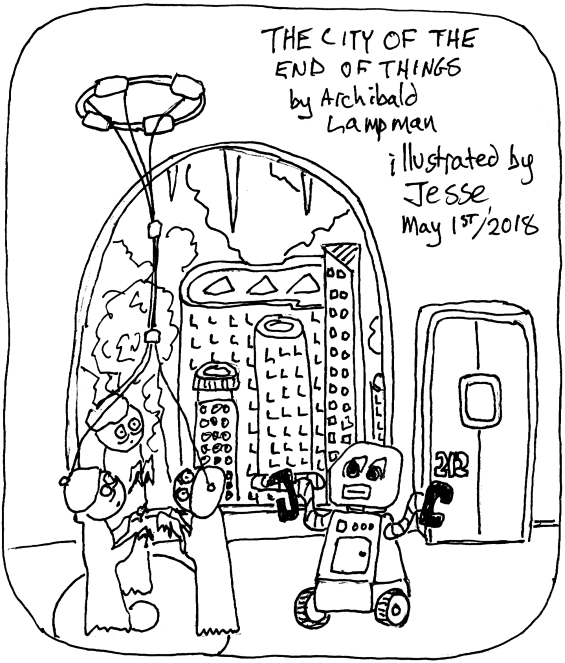
Posted by Jesse Willis

 The SFFaudio Podcast #401 – Celephaïs by H.P. Lovecraft, read by Gordon Gould. This is a complete and unabridged reading of the short story (16 Minutes) followed by a discussion of it (by Jesse, Paul Weimer, and Wayne June.)
The SFFaudio Podcast #401 – Celephaïs by H.P. Lovecraft, read by Gordon Gould. This is a complete and unabridged reading of the short story (16 Minutes) followed by a discussion of it (by Jesse, Paul Weimer, and Wayne June.)
Talked about on today’s show:
The Rainbow, May 1922, Marvel Tales, 1934, Weird Tales, Jun-July 1939, “A Posthumous Weird Fantasy”, a story about H.P. Lovecraft’s life,
Kuranes was not modern, and did not think like others who wrote. Whilst they strove to strip from life its embroidered robes of myth and to show in naked ugliness the foul thing that is reality, Kuranes sought for beauty alone. When truth and experience failed to reveal it, he sought it in fancy and illusion, and found it on his very doorstep, amid the nebulous memories of childhood tales and dreams.
so Lovecraft, reality ain’t pretty, always in fantasy, consciousness and objective reality, Jason Thompson comic book adaption, detail and attention, London, Yeasto and Beefo, Thomas Shap, gleefuly smashing a cat, opiates, a hashish man, the anonymity of Kuranes’ dream visage (in Jason Thompson’s rendering), Understanding Comics, wearied and wizened, a board game, an amazing adaptation, the page 8 sequence, the valley of Ooth Nargai, where form does not exist, a violet coloured gas, compass and protractor, manga style, hot air balloons, toward distant regions where the sea meets the sky, the domes are the same shape as the balloons, The Thing On The Doorstep, a script of imagery, going deep into the story, spending weeks in just 19 minutes, Fungi From Yuggoth, Dreamland-like,
XVII. A Memory
There were great steppes, and rocky table-lands
Stretching half-limitless in starlit night,
With alien campfires shedding feeble light
On beasts with tinkling bells, in shaggy bands.
Far to the south the plain sloped low and wide
To a dark zigzag line of wall that lay
Like a huge python of some primal day
Which endless time had chilled and petrified.I shivered oddly in the cold, thin air,
And wondered where I was and how I came,
When a cloaked form against a campfire’s glare
Rose and approached, and called me by my name.
Staring at that dead face beneath the hood,
I ceased to hope—because I understood.
The Gardens of Yinand from Celephais:
One night he went flying over dark mountains where there were faint, lone campfires at great distances apart, and strange, shaggy herds with tinkling bells on the leaders; and in the wildest part of this hilly country, so remote that few men could ever have seen it, he found a hideously ancient wall or causeway of stone zigzagging along the ridges and valleys; too gigantic ever to have risen by human hands, and of such a length that neither end of it could be seen. Beyond that wall…
it’s a dream but it is also real, Kubla Khan by Samuel Taylor Coleridge, a teetotaler, far more fascinating is the man himself, at points in his life, his dreams live on, eighty years later, immortality, he’s alive for a lot more people than he was when he was alive, horrifying vs. a slow sad tragedy, reflecting H.P. Lovecraft’s life, uncompromising, attitudes towards money, lies and untruths, up-selling, The Diary Of Alonzo Typer, William Lumley, a Thomas Shap character himself, the pathetic people who tell lies about their own life experience in order to make life more tolerable, the last paragraph, played mockingly, Trevor Towers, the purchased atmosphere of extinct nobility, offensive brewers, The Great Gatsby, that resentment, so tragic, so awesome, the two images of Trevor Towers, thinness of reality, and the neighbouring regions of dream, his eye, the naked ugly reality, he’s killed himself, you’re out king!, The Coronation Of Mr. Thomas Shap by Lord Dunsany, tongue in cheek, ironic, to persuade customers, a more compromised Lovecraft, a dignity of nobility, your everyday fella, particularity imaginative, a fable, don’t let it effect your work, living on the skeleton of his ancestry (or he’s a writer), tweeting dreams, the writer’s life,
XXVIII. Expectancy
I cannot tell why some things hold for me
A sense of unplumbed marvels to befall,
Or of a rift in the horizon’s wall
Opening to worlds where only gods can be.
There is a breathless, vague expectancy,
As of vast ancient pomps I half recall,
Or wild adventures, uncorporeal,
Ecstasy-fraught, and as a day-dream free.It is in sunsets and strange city spires,
Old villages and woods and misty downs,
South winds, the sea, low hills, and lighted towns,
Old gardens, half-heard songs, and the moon’s fires.
But though its lure alone makes life worth living,
None gains or guesses what it hints at giving.
there’s that wall again, the wall as representative of the line between life and death, Ex Oblivione, they’re all dream-quests, “rift”, how the words associate with one another, all the abysses that Lovecraft talks about, The Strange High House In The Mist, a god having lunch, being thrown off the Earth, and yet…, a gate, a void, astral projection, the only way to the dream world (and space), super resonant, that’s great!, the wall over which the imagining and expectancy of what could be, that alone makes life worth living, embracing the fact you’re going to be extinct, that depth is unplumbed, a “problematic depth”, A Voyage To Arcturus by David Lindsay, wanting to be an astronomer, going on night walks, it’s isolating, he’s walking alone here, the “rift”,
Faith had urged him on, over the precipice and into the gulf, where he had floated down, down, down; past dark, shapeless, undreamed dreams, faintly glowing spheres that may have been partly dreamed dreams, and laughing winged things that seemed to mock the dreamers of all the worlds. Then a rift seemed to open in the darkness before him, and he saw the city of the valley, glistening radiantly far, far below, with a background of sea and sky, and a snow-capped mountain near the shore.
skip down
But three nights afterward Kuranes came again to Celephaïs. As before, he dreamed first of the village that was asleep or dead, and of the abyss down which one must float silently; then the rift appeared again, and he beheld the glittering minarets of the city, and saw the graceful galleys riding at anchor in the blue harbour, and watched the gingko trees of Mount Aran swaying in the sea-breeze.
and
XXIX. Nostalgia
Once every year, in autumn’s wistful glow,
The birds fly out over an ocean waste,
Calling and chattering in a joyous haste
To reach some land their inner memories know.
Great terraced gardens where bright blossoms blow,
And lines of mangoes luscious to the taste,
And temple-groves with branches interlaced
Over cool paths—all these their vague dreams shew.They search the sea for marks of their old shore—
For the tall city, white and turreted—
But only empty waters stretch ahead,
So that at last they turn away once more.
Yet sunken deep where alien polyps throng,
The old towers miss their lost, remembered song.
a sunken city, the city waits for them too, I don’t like it when people give me presents, faking it, for a minute or two, in that moment, Wayne always appreciates more cash, The City In The Sea by Edgar Allan Poe, Lo! Death has reared himself a throne, J.R.R. Tolkien, no Usher-ness, Little Princess Mee, Shap = Shaper (dream) or shop, profound, where the sea meets the sky, “Faith had urged him on, over the precipice and into the gulf, where he had floated down, down, down”, and “Endlessly down the horsemen floated, their chargers pawing the aether as if galloping over golden sands; and then the luminous vapours spread apart to reveal a greater brightness, the brightness of the city Celephaïs, and the sea-coast beyond, and the snowy peak overlooking the sea, and the gaily painted galleys that sail out of the harbour toward distant regions where the sea meets the sky.”, a dream written down, keep reading the same story over and over again, Paul’s map (or depiction) of Celephais, Campaign Cartographer, inspired to art, the abandoned village is Innsmouth, a river running through it, a completely inverted vision, ancient atavism vs. beauty and a new golden age, steering into The Dreamquest Of Unknown Kadath, Carter once knew Kuranes in waking life, Carter knows me, the more muscular adventurer, all around the Dreamlands, the infection of dream travel, Kuranes’ last name is Trevor, a hit of this hookah, back to reality, back to childhood, The Dream-Quest Of Vellitt Boe by Kij Johnson, exiled to reality, better off in the real world, the reverse, Wayne June’s audiobooks for Thomas Shap and Celephaïs, a dream fiction collection, have them all together, at your terrible job, retire to the sea-coast and go for a sleep walk, read it on your own.
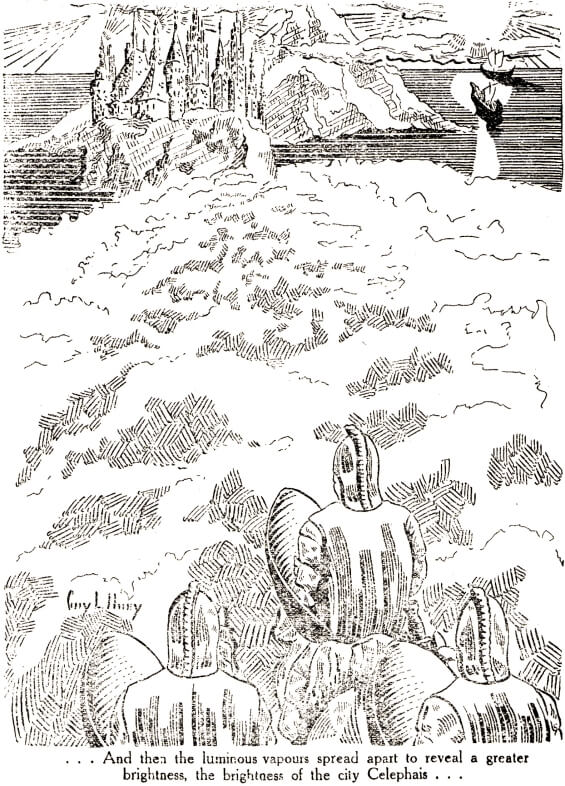
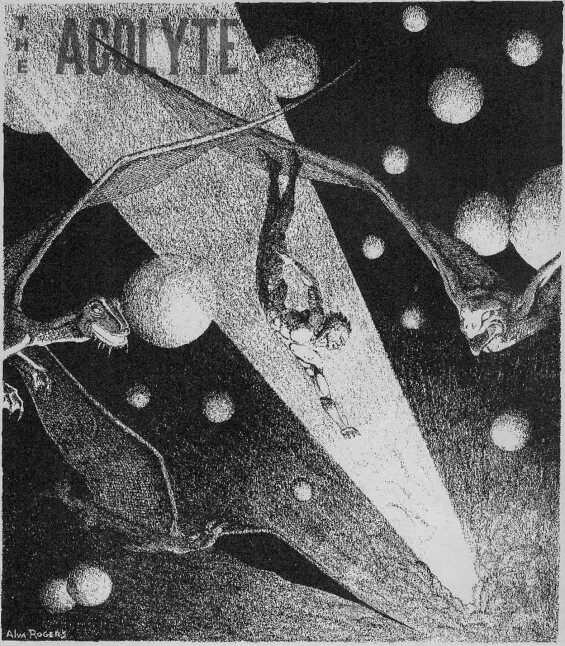
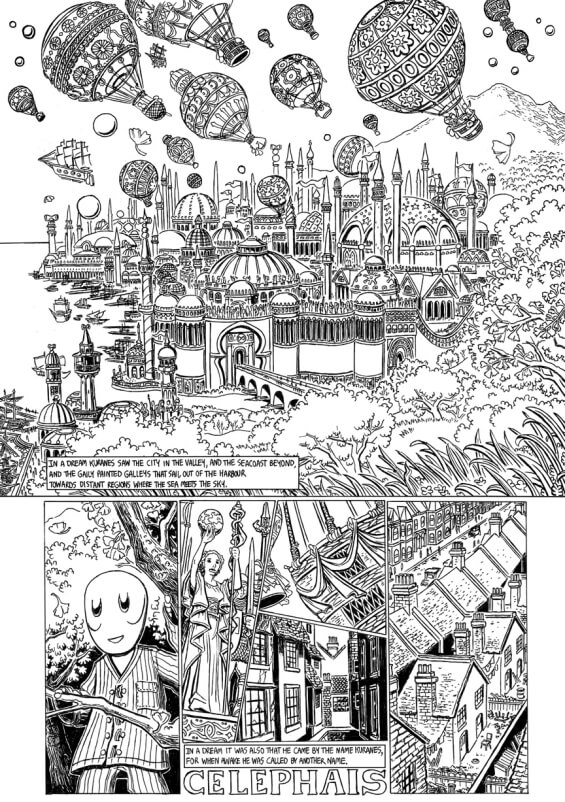
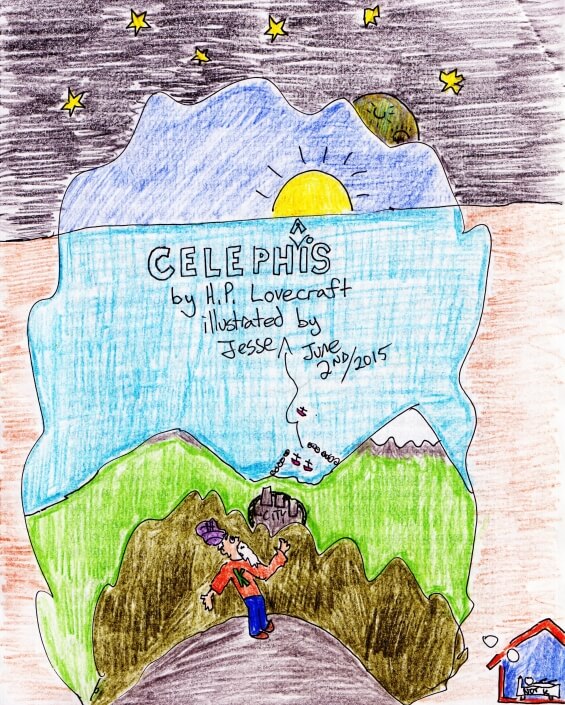
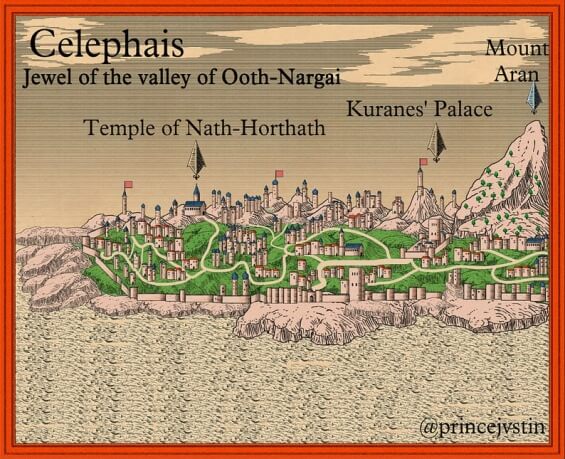
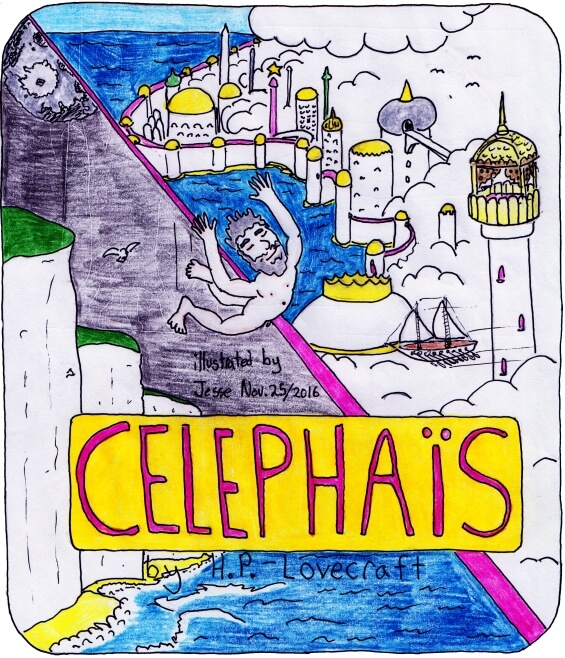
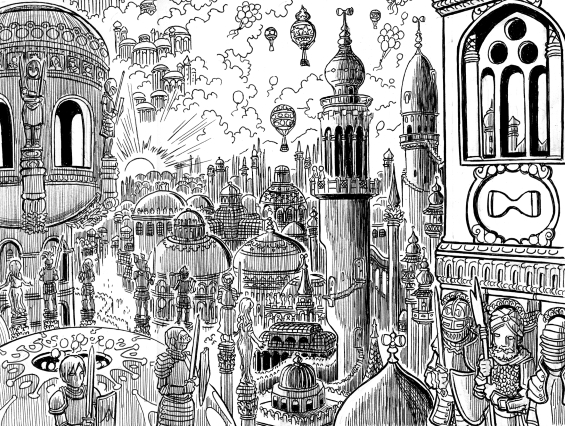
Posted by Jesse Willis

 The SFFaudio Podcast #328 – The White Ship by H.P. Lovecraft; read by Mr Jim Moon. This is an unabridged reading of the story (1 hour 23 minutes) followed by a discussion of it. Participants in the discussion include Jesse, Seth, and Mr Jim Moon.
The SFFaudio Podcast #328 – The White Ship by H.P. Lovecraft; read by Mr Jim Moon. This is an unabridged reading of the story (1 hour 23 minutes) followed by a discussion of it. Participants in the discussion include Jesse, Seth, and Mr Jim Moon.
Talked about on today’s show:
a Science Fiction, Horror, or Fantasy story?, hard to classify, Idle Days On The Yann by Lord Dunsany, wistful elements, The Rime Of The Ancient Mariner, a spiritual or psychological analog, a long prose poem, describing lands that never were, a lovely little tale, narrative isn’t exactly the point, the bird, the bird as an eidolon of the ship, the eidolon Lathi, Jason Thompson‘s comic adaptation of The White Ship, the ghost ship, why is the bird blue?, over the cataract, falls as if it wasn’t going to, the world ending, a description of Cathuria, aloe and sandalwood, an imagined land, dreaming Cathuria into existence, the sacred river Narg, Kublai Khan, a dream snatched away and smashed, Samuel Taylor Coleridge and Edgar Allan Poe, Dream-Land by Edgar Allan Poe,
By a route obscure and lonely,
Haunted by ill angels only,
Where an Eidolon, named NIGHT,
On a black throne reigns upright,
I have reached these lands but newly
From an ultimate dim Thule—
From a wild weird clime that lieth, sublime,
Out of SPACE—Out of TIME.
Lathi and Thalarion, Celephais, The Dream Quest Of Unknown Kadath, an old dreamer and lighthouse keeper of Kingsport town, fewer and fewer ships, a great delusional fugue state, a white spar and a blue bird, Polaris, a watchman in a watchtower, a beautiful symmetry, structural similarity, a beautiful dead woman, Eleonora, Ligeia, Morella, un-whimsical, Hypnos, the bearded mentors, astral projected journey, going to far, moon-beams, The Moon-Bog, a bridge of moon-beams, big ancient cities, civilization, you can’t have books without cities, lore x 3, he was given many books in his youth, when he was young and filled with wonder, Thanatos the Greek god of death, the throne of Azathoth, a dream of falling, the sin, Randolph Carter is seeking in the dreamlands, where the gods dwell, the gods have conquered, the person from Porlock, Jeff Vandermeer’s dream, William Hope Hodgson, fungal growths,
Then came we to a pleasant coast gay with blossoms of every hue, where as far inland as we could see basked lovely groves and radiant arbours beneath a meridian sun. From bowers beyond our view came bursts of song and snatches of lyric harmony, interspersed with faint laughter so delicious that I urged the rowers onward in my eagerness to reach the scene. And the bearded man spoke no word, but watched me as we approached the lily-lined shore. Suddenly a wind blowing from over the flowery meadows and leafy woods brought a scent at which I trembled. The wind grew stronger, and the air was filled with the lethal, charnel odour of plague-stricken towns and uncovered cemeteries. And as we sailed madly away from that damnable coast the bearded man spoke at last, saying: “This is Xura, the Land of Pleasures Unattained.”
The Valley Of Unrest by Edgar Allan Poe,
Once it smiled a silent dell
Where the people did not dwell;
They had gone unto the wars,
Trusting to the mild-eyed stars,
Nightly, from their azure towers,
To keep watch above the flowers,
In the midst of which all day
The red sun-light lazily lay.
Now each visitor shall confess
The sad valley’s restlessness.
Nothing there is motionless—
Nothing save the airs that brood
Over the magic solitude.
Ah, by no wind are stirred those trees
That palpitate like the chill seas
Around the misty Hebrides!
Ah, by no wind those clouds are driven
That rustle through the unquiet Heaven
Uneasily, from morn till even,
Over the violets there that lie
In myriad types of the human eye—
Over the lilies there that wave
And weep above a nameless grave!
They wave:—from out their fragrant tops
External dews come down in drops.
They weep:—from off their delicate stems
Perennial tears descend in gems.
what the heck does that mean?, nameless things that feast upon the corpses of men, a large layer of death, allegorical symbolism, the platonic forms,
“On the green and flowery mountains of Cathuria stand temples of pink marble, rich with carven and painted glories, and having in their courtyards cool fountains of silver, where purl with ravishing music the scented waters that come from the grotto-born river Narg.”
what good writing!, Fungi From Yuggoth XVIII: Gardens Of Yin
Beyond that wall, whose ancient masonry
Reached almost to the sky in moss-thick towers,
There would be terraced gardens, rich with flowers,
And flutter of bird and butterfly and bee.
There would be walks, and bridges arching over
Warm lotos-pools reflecting temple eaves,
And cherry-trees with delicate boughs and leaves
Against a pink sky where the herons hover.All would be there, for had not old dreams flung
Open the gate to that stone-lanterned maze
Where drowsy streams spin out their winding ways,
Trailed by green vines from bending branches hung?
I hurried—but when the wall rose, grim and great,
I found there was no longer any gate.
verse for birthday cards, The Haunted Lake, Christmas poems, a concordance of themes, all the shades of Lovecraft, The Picture In The House, The Bells, The Shadow Over Innsmouth, the discover of sanity blasting horrors, ebbs and flows, soul and sanity loss, cosmic transcendence, drawing what we see,
“For the aeons that I dwelt there I wandered blissfully through gardens where quaint pagodas peep from pleasing clumps of bushes, and where the white walks are bordered with delicate blossoms.”
Basil Elton’s sin, distant whispers, really?, better than Sona-Nyl?, “Dude you’ve always lived alone!”, a sea-faring Tyler Durduen, a Coleridgian-Obi-Wan Kenobi, a big eastern theme, fantastical oriental places, like Narnia, Arabia mythologized, a marked contrast, Lovecraft as a homebody in the center of a great American port, like living in Atlanta and never getting on an airplane, Citizen Of The Galaxy by Robert A. Heinlein, wherever you go, there you are, an interesting visualization, Celephais, writing down dreams, a penniless tramp, travels tell me, King Kuranes, his spirit lives on in the dreamlands, scented monsters, the basalt pillars of the west, Jason And The Argonauts, the Pillars of Hercules, Gibraltar, DC Comics, Thalarion and Themyscira, The H.P. Lovecrafts‘ song The White Ship, late-sixties hippies and beatniks, wow these are AMAZING!, J.R.R. Tolkien.
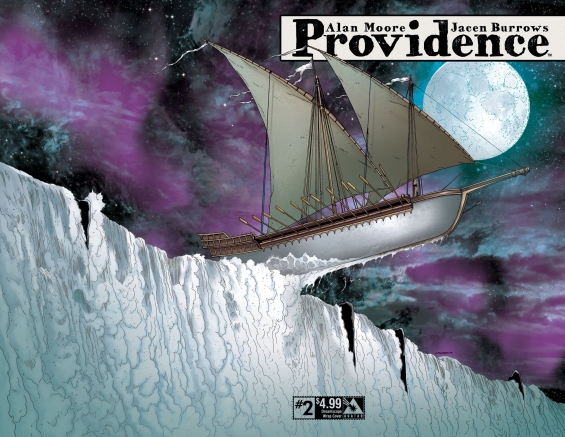
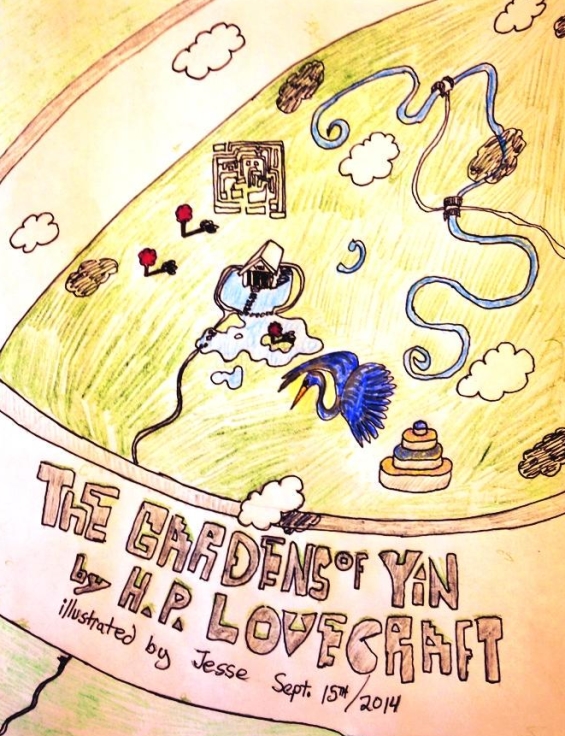
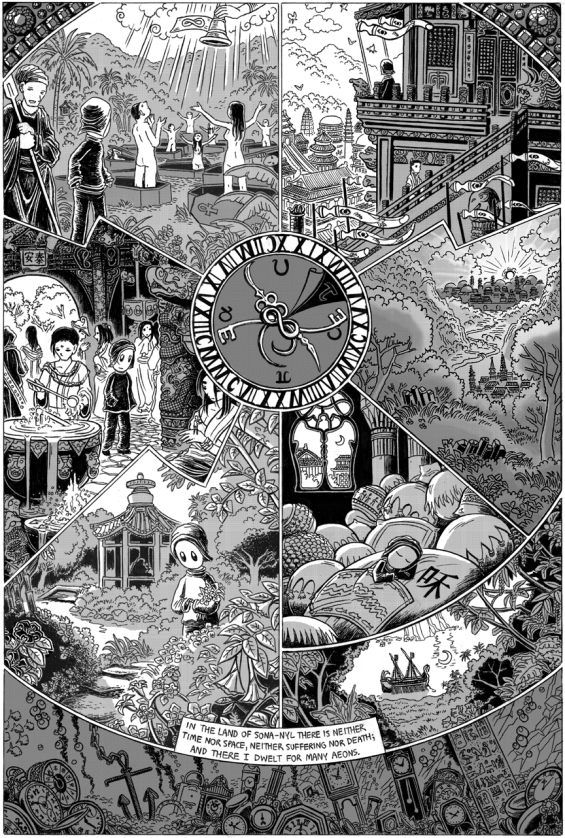
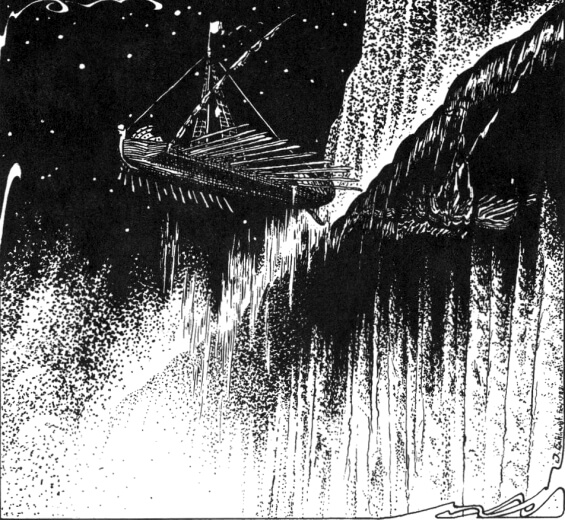
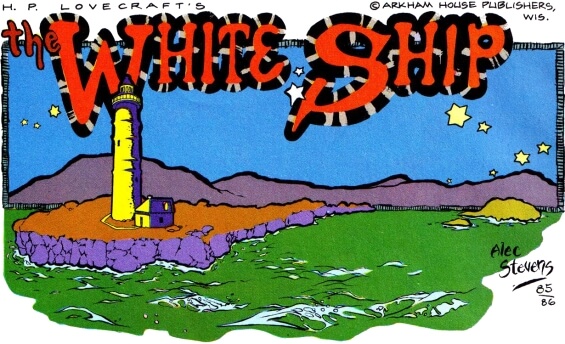

Posted by Jesse Willis

 The SFFaudio Podcast #303 – Jesse and Paul Weimer talk about The Narrative Of Arthur Gordon Pym Of Nantucket by Edgar Allan Poe
The SFFaudio Podcast #303 – Jesse and Paul Weimer talk about The Narrative Of Arthur Gordon Pym Of Nantucket by Edgar Allan Poe
Talked about on today’s show:
1838, Poe’s only completed novel, Paul’s Poe years, The Tell-Tale Heart, a macabre sort of phase, Deus Irae by Philip K. Dick and Roger Zelazny, fix-ups, Premature Burial, Ms. Found In A Bottle, The Oblong Box, The Gold Bug, secret codes, Poe is old and public domain and not particularly racist, The Pit And The Pendulum, the Poe theme, the death of a beautiful woman is conspicuous by her absence, the meta-commentary, Tristram Shandy, The Cask Of Amontillado, a dog named Tyger (burning bright?), William Blake, Jules Verne, An Antarctic Mystery, Ms. Found In A Copper Cylinder, Antarctica, “Ms. Found In A…”, “it was begun to have been serialized”, fake stories as true stories, Captain Cook’s Antarctic expeditions, “a labyrinth of lumber”, how to load a ship, Moby Dick by Herman Melville, Washington Irving, SF as a generally American phenomenon, a slow creep of fantastic elements, full-blown surrealism, the drinking, on the Grampus, dressing like a ghost, another phantom in white, “Mr. Pym is not available”, a genuine narrative, missing islands, a metaphor for alcoholism, sailing in a storm, half-sunk/drunk, echoes, the plague ship, the Penguin, echoes, all these lies, a note from the Wikipedia entry, fictional analogues for real events, autobiographical drinking, The Lighthouse by Edgar Allan Poe (a fragment), “I expected to inherit some money”, money problems, “he’s pouring his troubles into this manuscript”, this is Poe’s version of Dude, Where’s My Car?, an unreliable narrator, an excellent story, Samuel Taylor Coleridge’s The Rime Of The Ancient Mariner, albatrosses, thematic similarities, they eat many birds, “an unmentionable thought”, subsequent cannibalism, the same ghost ship as in Rime?, Antarctic spirits, H.P. Lovecraft, the subtitle:
Comprising the Details of Mutiny and Atrocious Butchery on Board the American Brig Grampus, on Her Way to the South Seas, in the Month of June, 1827. With an Account of the Recapture of the Vessel by the Survivers; Their Shipwreck and Subsequent Horrible Sufferings from Famine; Their Deliverance by Means of the British Schooner Jane Guy; the Brief Cruise of this Latter Vessel in the Atlantic Ocean; Her Capture, and the Massacre of Her Crew Among a Group of Islands in the Eighty-Fourth Parallel of Southern Latitude; Together with the Incredible Adventures and Discoveries Still Farther South to Which That Distressing Calamity Gave Rise.
who wrote the subtitle?, they didn’t have the concept of spoilers, the opposite of a spoiler, The Savage Land (Marvel Universe), Edgar Rice Burroughs’ The Land That Time Forgot, a hollow earth theory, this is a Science Fiction book in a strange sense, what’s with the multi-layered coloured water?, the strange creatures, the creature’s corpse in the white waters, is Australia a place?, At The Mountains Of Madness, why Poe is not in outer space, basically these Antarctic people are aliens, this is very Stanley G. Weinbaum (A Martian Odyssey), Michael Moorcock’s Seas Of Fate, H. Rider Haggard, duplicitous natives in the black land, what will be in the white lands?, a heavily read book (in the 19th century), The House Of The Seven Gables by Nathaniel Hawthorne, when Lovecraft describes it…, haunted by the architecture of homes, Lovecraft’s description of Pym:
“In the Narrative of A. Gordon Pym the voyagers reach first a strange south polar land of murderous savages where nothing is white and where vast rocky ravines have the form of titanic Egyptian letters spelling terrible primal arcana of earth; and thereafter a still more mysterious realm where everything is white, and where shrouded giants and snowy-plumed birds guard a cryptic cataract of mist which empties from immeasurable celestial heights into a torrid milky sea.”
pouring into the hollow Earth?, Journey To The Center Of The Earth, At The Earth’s Core, Kublah Khan by Samuel Taylor Coleridge, leaving the ending open to the reader, how will he get back to Nantucket?, the names A. Gordon Pym and E. Allan Poe, framing devices, The Turn Of The Screw, a framing device gives the reader an extra distance, The Secret Sharer by Joseph Conrad, Robert Silverberg’s The Secret Sharer, the southern polar bear, “Tekeli-li, tekeli-li.” the face of an open book, downy feathers, what does it mean?, whiteness, philological scrutiny, “white-phobic”, the audiobook narration, copyright, a total Poe thing to do, Poe loved cryptography, Poe would be writing in Elvish, a font nerd, hanging out with Charles Stross and Alan Moore, can you imagine Poe at a Worldcon?, a drunkard’s story, shoplifting at The Innsmouth Bookshop, Fungi From Yuggoth XV: Antarktos:
Deep in my dream the great bird whispered queerly
Of the black cone amid the polar waste;
Pushing above the ice-sheet lone and drearly,
By storm-crazed aeons battered and defaced.
Hither no living earth-shapes take their courses,
And only pale auroras and faint suns
Glow on that pitted rock, whose primal sources
Are guessed at dimly by the Elder Ones.If men should glimpse it, they would merely wonder
What tricky mound of Nature’s build they spied;
But the bird told of vaster parts, that under
The mile-deep ice-shroud crouch and brood and bide.
God help the dreamer whose mad visions shew
Those dead eyes set in crystal gulfs below!
the black cone, the primal sources, Lovecraft quoting himself, that shrouded white figure, “Tekeli-li don’t kill the albatross”, Lemuria, Thule, the novel as a journey, how do you return from the surreal?, what happened to Tyger?, they ate him!, Dirk Peters (so manly he has two penises), Tyger’s collar, someone was going to drown the dog, poor Tyger, a horrendously awful horrifying experience, when Paul Theroux visited Jorge Luis Borges he read him The Narrative Of Arthur Gordon Pym Of Nantucket, Borges thought Pym was Poe’s greatest work, the interest in the meta, strange runes, Lovecraft was a teetotaler, deep into madness (not drunken madness), genetic disease or confronting reality, The Call of Cthulhu, dreams, a fever dream?, forgetting, a change in tenses, the missing two or three final chapters, Xeno’s paradox, a Mercator map, and Greenland, is that all racism?, “a nautical negro”, Toni Morrison, the black cook, don’t go into a tiny box-canyon with natives of any colour, scrupulously honest, earlier bushwhacked voyagers, going piratical?, going whaling?, the mutiny, Mr. Starbuck, why is Pym stowing away in the first place?, the captain that ran them down was drunk, boating skills, Treasure Island, Augustus’ father, the inexplicable weevils, “taking liberally from the spirits”, this narrative is full of holes, a free sea voyage, Pym is a teenager, everybody has a boat on Nantucket, an adventure of a lifetime, Pym is “not available”, Jeremiah N. Reynolds, Poe’s last word was “Reynolds”, a possibly apocryphal story, Mocha Dick, the long conversation of conversation of Science Fiction, Moby Dick is in dialogue with Pym and Mocha Dick, bibliographic archaeology, The Island Of Doctor Moreau by H.G. Wells, in a dinghy, considering cannibalism, drawing straws, “and dropped like stones”, did their bones dropped likes stones?, the narrator becomes more and more unreliable, dis-masted, a teetotaler who drinks only coffee.



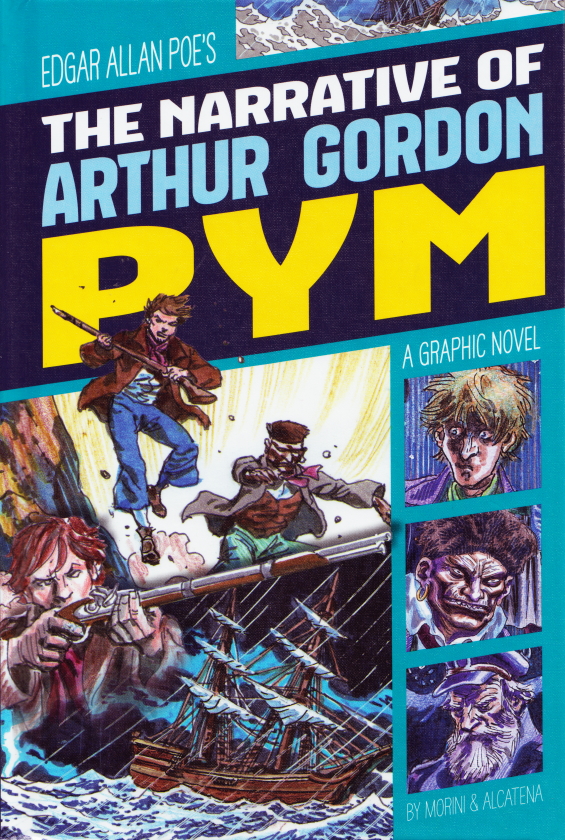
Posted by Jesse Willis

 The SFFaudio Podcast #270 – The Rime of the Ancient Mariner by Samuel Taylor Coleridge; performed by Sir Richard Burton with John Neville and Robert Hardy. This is a complete and unabridged reading of the poem (28 minutes) followed by a discussion of it. Participants in the discussion include Jesse, Seth, and Mr Jim Moon!
The SFFaudio Podcast #270 – The Rime of the Ancient Mariner by Samuel Taylor Coleridge; performed by Sir Richard Burton with John Neville and Robert Hardy. This is a complete and unabridged reading of the poem (28 minutes) followed by a discussion of it. Participants in the discussion include Jesse, Seth, and Mr Jim Moon!
The audio for today’s episode comes to us courtesy of Resonance FM.
Talked about on today’s show:
The ballad form and rhyme scheme; transposing poem to Gilligan’s Island theme; poem’s opaque writing style; Romanticism’s links to modern science fiction and fantasy; Coleridge’s primary imagination; Tolkien’s sub-creation; Virgil Finlay’s art; Gustave Doré’s art; the poem’s influence on Poe and Lovecraft; Mariner as a bridge between old folklore ballads and new gothic literature; poem influenced buy medieval sea and travel tales; nature as a fantasy playground of experience; William Wordsworth’s influence on the poem; Stephen Gill’s biography of Wordsworth; Shakespeare in Love and the creative process; the special effects of Coleridge’s rhyme; “what the hell are those sea snakes?”; eels; the Sargasso Sea; the concept of Purgatory; a Salvation story injected with Pagan themes; Poe’s “imp of the perverse” as in his Black Cat; the frame narrative as morality tale; ghost ship à la Pirates of the Caribbean; the Flying Dutchman; Captain Kirk; the geography of the mariner’s voyage; search for the Northwest Passage; Aurora Australis; St. Elmo’s Fire; The Tempest; Charles Dickens’s “genius of the winter weather”; H.P. Lovecraft’s antarctic literature; parallel to Tolkien’s Leaf by Niggle; William Wordsworth’s We Are Seven; the natural and supernatural poems in Lyrical Ballads; Coleridge’s opium habit; Romantic poets as rock stars; intensity of Coleridge’s writing; comparing Wordsworth and Coleridge to Lennon and McCartney; the hermit as Tom Bombadil?, a wise man in retreat; hermit as crazy homeless dude; readers’ response to the poem; Blakeian progression from innocence to experience; Longinus; Kubla Khan; the H.G. Wellspring.
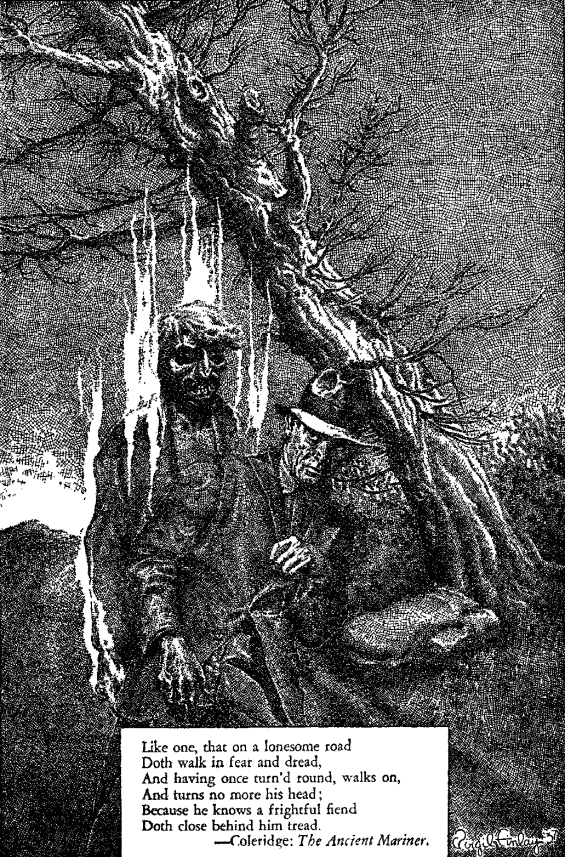
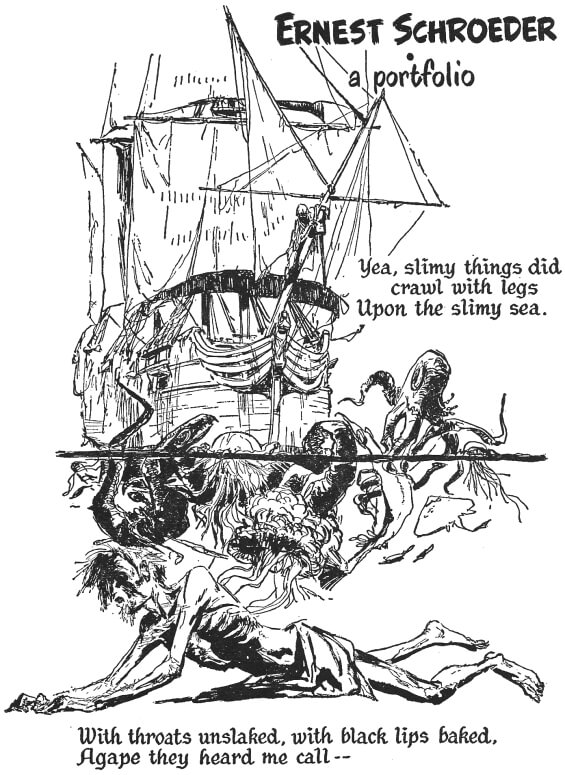
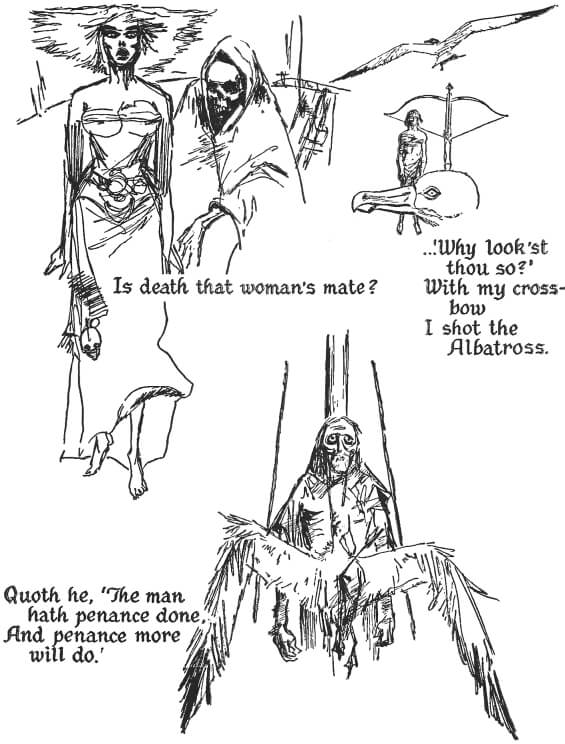
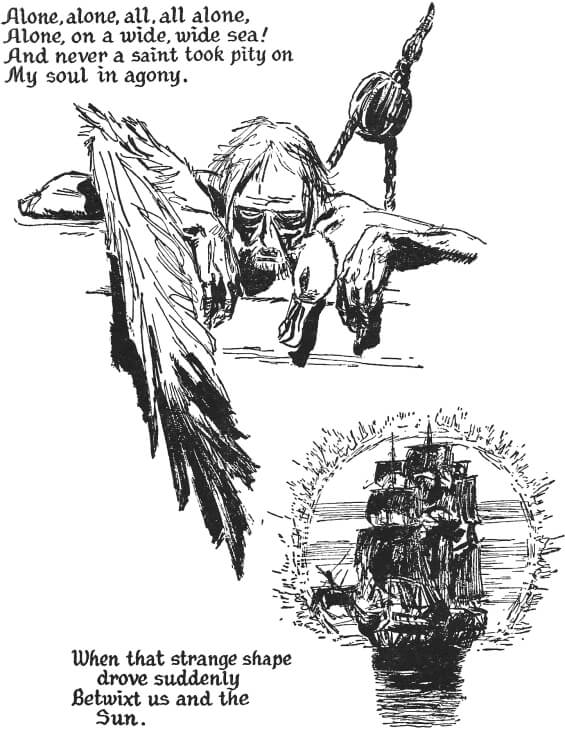
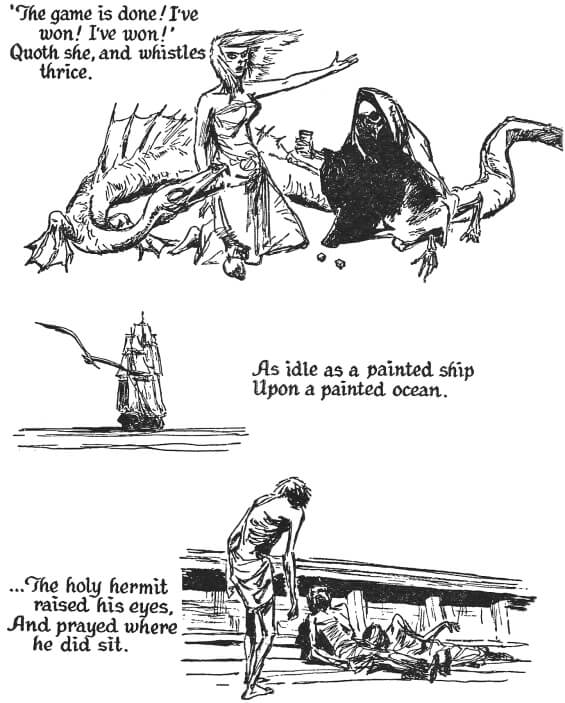
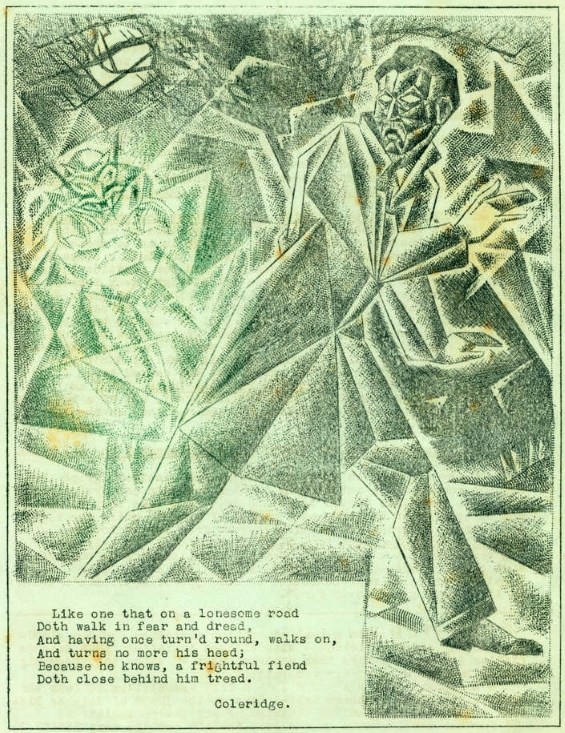
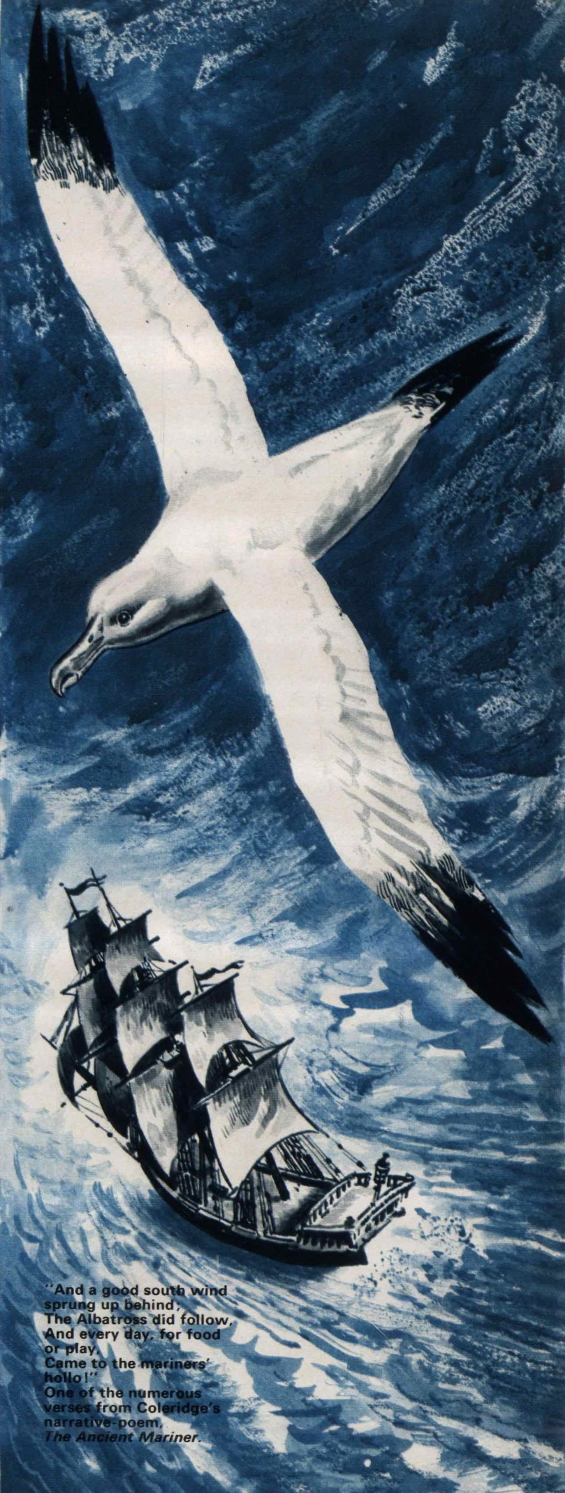
Posted by Jesse Willis